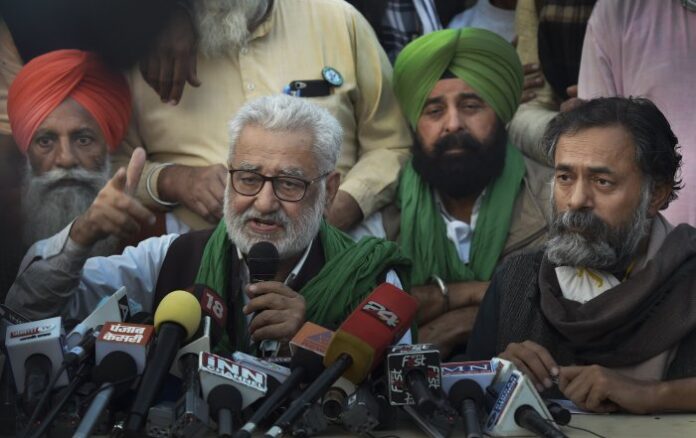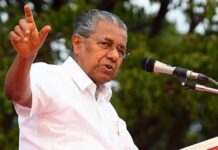Darshan Pal, one of the prominent farmer leaders at the forefront of the ongoing farmers’ movement at the four borders of Delhi spoke on March 15, 2021, at the 46th regular session of the United Nations Human Rights Council. Pal, who is part of the Samyukta Kisan Morcha, a coalition of forty farmers’ Unions in his speech pulled the attention of the world towards the plight of farmers and their demand for the repeal of three farm laws passed by the current government led by Narendra Modi.
A farmer himself, Pal thanked the UN for its ‘Declaration on the Rights of Peasants and Other People Working in Rural Areas’ that it adopted in 2018. He also thanked the UN for giving space to raise the farmers’ issues. India is one of the signatories of this declaration. However, Pal observed in his speech yesterday that, Indian farmers had protection guaranteed through measures like Minimum Support Price (MSP) until recently; the new farm laws snatches away such protections. He said that these laws would not double the incomes of the farmers and further explained that the farmers in the states which have no MSP are forced to live in acute poverty or migrate to different states in search of employment.
‘We (farmers) want reforms but not these ones,’ said the veteran leader. Pointing out one of the tenets of the UN Declaration which states that farmers must be consulted before the making of laws, he noted that the Government of India has violated the Declaration; and he requested the UN to urge the government to abide by the declaration. Pal stated that the government has to repeal the three farm laws that the government has passed and consult with the farmers and their leaders and frame farmers and environment-friendly laws as required under the declaration.
Declaration on the Rights of Peasants and Other People Working in Rural Areas and the farm laws
The Farmers’ Produce Trade and Commerce (Promotion and Facilitation) Act, The Essential Commodities (Amendment) Act, and The Farmers (Empowerment and Protection) Agreement on Price Assurance and Farm Services Act are the three infamous farm laws passed by the current Modi government. The enactment of these laws by the government has mobilised the farmers across the country against this government. Farmers are mainly criticising the government for not consulting with them before formulating these laws. As Darshan Pal said at the UN yesterday, the government not consulting the farmers is a violation of a tenet in the United Nations Declaration on the Rights of Peasants and Other People Working in Rural Areas.
Article 2.3 of the Declaration states,
“Without disregarding specific legislation on indigenous peoples, before adopting and implementing legislation and policies, international agreements and other decision-making processes that may affect the rights of peasants and other people working in rural areas, States shall consult and cooperate in good faith with peasants and other people working in rural areas through their own representative institutions, engaging with and seeking the support of peasants and other people working in rural areas who could be affected by decisions before those decisions are made, and responding to their contributions, taking into consideration existing power imbalances between different parties and ensuring active, free, effective, meaningful and informed participation of individuals and groups in associated decision-making processes.”
Also read: Samyukt Kisan Morcha Observes Anti-Privatisation Day
Far from consultations, the bills were just passed in the parliament without even being debated. Amidst the protest against The Farmers’ Produce Trade and Commerce (Promotion and Facilitation) Act, which dismantles Agricultural Produce Market (APMC), the government through ordinances passed the other two laws. Protesting farmers have asked what was the rush to pass these laws. The government however has failed to answer this question.
According to a Down To Earth report, Farmers make up 60 percent of the Indian population; farming 18 percent of the country’s gross domestic product. Marginal farmers comprise 85 percent of the total population of farmers. The monthly income of agricultural households from cultivation has recorded a marginal increase since the national census in 2011: In 2016, the average monthly income of agricultural families was estimated around Rs 3,140. Almost 52 percent of total rural agricultural households were estimated to be under heavy debt. The average annual debt amount per agricultural household is estimated to be around Rs 104,602. These trends can be associated with increasing farmer distress, urban migration, and suicide rates in rural India, especially among farmers.
Also read: Visakha Steel Plant is a Profitable PSU- Why Govt. Wants to Privatise it?
The stakes in the agriculture reforms in India are very high. These laws take out APMC’s and hands over the livelihoods of the 60 percent of the population into the hands of the private traders. These three laws also insulate private traders from any legal recourse taken by the farmers. This is not only a violation of the fundamental rights entrusted by the Constitution of India but is also against what India agreed upon in the UN in 2018.
According to Article 3.2 of the UN Declaration,
Peasants and other people working in rural areas have the right to determine and develop priorities and strategies to exercise their right to development.
Article 16 (3) says,
States shall take appropriate measures to strengthen and support local, national and regional markets in ways that facilitate, and ensure that peasants and other people working in rural areas have, full and equitable access and participation in these markets to sell their products at prices that allow them and their families to attain an adequate standard of living.
Contrary to the articles of the UN Declaration, the three laws as Darshan Pal highlighted yesterday is far from facilitating ‘full and equitable access and participation in these markets to sell their products at prices that allow them and their families to attain an adequate standard of living.’ The laws dismantle the pre-existing systems which assured this.
Click here to subscribe to our youtube channel




























